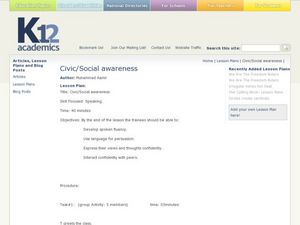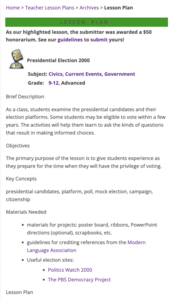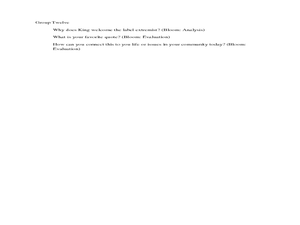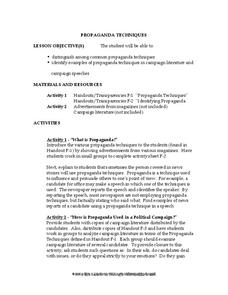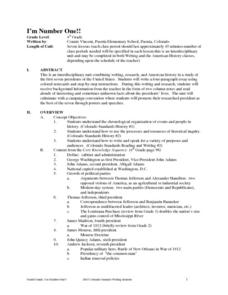Curated OER
Let the Campaign Begin
Students examine the many steps involved in the electoral process. They examine past president's campaigns and write an announcement speech for the candidate of their choice.
Curated OER
The Presidential Campaign Game
Students play a game. In this election lesson, students play the Presidential Campaign Game. Students learn about the politics and process of electing a president.
Prestwick House
Rhetorical Devices in Political Speeches
Have you ever watched a political speech and felt your heart beat a little faster, and your opinion either solidify or begin to slightly change? Rhetorical devices can be a strong tool in an effective and powerful speech. A short lesson...
Curated OER
Speech! Speech!
Critical thinkers consider how word choice in speeches impacts the meaning and effectiveness of the message being presented. They examine and respond to some of the speeches made at the 2004 Republican and Democratic National...
Curated OER
May The Best Character Win
Students examine the financial committment to running a campaign. They discuss the difference between electroal and popular votes. They realize how involved a political campaign is!
Curated OER
Political Race
Learners explore political topics and issues that often involve discussions of race or ethnicity. They develop campaign speeches voicing their stances on their assigned topics and explore how their racial and/ or ethnic backgrounds shape...
Curated OER
Freedom by the Fireside: The Legacy of FDR's "Four Freedoms" Speech
Young scholars read and analyze Franklin Delano Roosevelt's 1941 State of the Union Address. They listen to recordings of speeches by F.D.R., answer discussion questions, and participate in a debate.
Curated OER
What is a Democracy?
Young scholars identify what makes a country democratic and compare United States and Indian political party symbols. They create their own political party and party symbol. They create a campaign speech, participate in the voting...
Curated OER
Free To Speak And Free To Post?
Students research online and in books city statutes regarding posting signs on utility poles, interview appropriate officials about ordinances and how completely it is enforced, explore what has happened elsewhere when citizens decided...
Curated OER
Free to Speak and Free to Post?
Learners research on the Web and in books with city statutes or call city officials to find out the local ordinance on posting signs on utility poles. If illegal, students explore what has happened elsewhere when citizens decided to...
Curated OER
Recruiting a Few Good Citizens
Students write persuasive speeches to recruit soldiers for a Civil War company. In this Civil War U.S. history and writing lesson plan, students work in groups to create a recruiting poster and write a speech to persuade soldiers to join...
Curated OER
Civic/Social Awareness
Develop spoken fluency, persuasive speaking skills, and confidence by having your class practice their public speaking skills. They compose and deliver persuasive speeches as they participate in five different speech tasks. A...
Curated OER
Presidential Election 2000
Students examine the presidential candidates and their election platforms. They further analyze the platforms by creating a chart to determine which candidate most represents his or her beliefs and values.
Classroom Law Project
Should we believe everything we read? Becoming a discerning consumer of media
Class members investigate the role media should play in a healthy democracy. As part of this study, groups analyze political advertising, use FactCheck to assess not only the veracity of but the persuasions techniques used in candidates'...
Curated OER
Read My Lips
Students research and examine Florida's government and the three branches of government. They write and present campaign speeches that explain the reasons why they would be the best candidates for governor.
National Endowment for the Humanities
Martin Luther King, Jr. and Nonviolent Resistance
Was nonviolent resistance the best means of securing civil rights for black Americans in the 1960s? In this highly engaging and informative lesson, your young historians will closely analyze several key documents from the civil rights...
Curated OER
Results In On Mock Election
Young scholars examine the two presidential candidates in 2000, and identify their own stance on campaign issues. They create fictional candidates that represent their beliefs, and write campaign speeches from their point of view.
National First Ladies' Library
Presidential Campaigning--Front Porch Style
High schoolers compare and contrast "front porch" political campaigns and modern day traveling campaigns of past presidents. Using the internet and other sources, they explore President Harding's campaign and platform. Using the internet...
Curated OER
King Campaigns in Birmingham
Eleventh graders discuss the contributions of Reverend Martin Luther King, Jr. In this civil rights movement lesson, 11th graders read Rev. King's "Letter from Birmingham Jail", answer questions about the letter, share their...
Curated OER
Propaganda Techniques
Students recognize and separate various techniques of propaganda. In this propaganda lesson, students read a handout about the various types of propaganda and how it is used ina political campaign.
Curated OER
Building a Class Government Through Elections
Students participate in their own classroom election to fill multiple positions. Individually, they examine campaign speeches and write their own. Once the election occurs, they must fulfill their duties as outlined in their campaign.
C-SPAN
Presidential Candidate Research
Don't let the young citizens in your social studies class get all their election information from inflammatory commercials and arguing pundits. Use a lesson plan from C-SPAN to guide class members through an election season with a...
Curated OER
I'm Number One!
Fourth graders complete a unit of lessons on the first seven presidents of the U.S. They conduct research, write a four-paragraph essay, and create posters and speeches for a simulated campaign convention.













